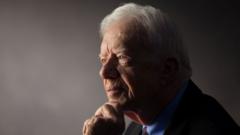Jimmy Carter's presidency, marked by a profound "crisis of confidence," faced pressing economic issues and challenges in global diplomacy during the late 1970s. As he departed the presidency in 1981, having navigated a tumultuous period highlighted by the Iranian hostage crisis and complex Middle Eastern dynamics, the events of his era echo through to Biden's administration today.
Both leaders grappled with foreign policy crises—Carter through the Soviet invasion of Afghanistan and Biden during the contentious withdrawal from Afghanistan in 2021. Biden's administration has notably struggled to prevent conflict escalation in the Middle East and manage the rising threat posed by Russia amidst the war in Ukraine. These issues illustrate an ongoing difficulty for American presidents to influence global affairs and the geopolitical chessboard they inhabit.
A landmark success of Carter's presidency lay in the Camp David Accords, fostering peace between Egypt and Israel. However, it left unresolved essential issues, such as the Palestinian conflict—an issue that has resurfaced dramatically with recent conflicts, placing further strain on Biden's foreign policy approach.
Carter's initiatives in energy conservation continue to resonate today, as Biden faces a modern crisis of climate change, similarities in public sentiment against government remain a challenging constant. Both presidents experienced dwindling public trust, unable to reverse the pervasive skepticism towards government that was heightened through scandal and crisis.
As they navigated adversities, the lows of a struggling economy haunted Carter, who faced immense inflation pressures. This mirrors Biden’s current struggle, where inflation has sown discontent among constituents, despite job growth and economic resilience.
The contrasting legacies of Carter and Biden further highlight varying approaches to leadership and public service after their presidencies. While Carter dedicated his post-White House years to humanitarian efforts, Biden's focus seems to drift towards preparing for potential reelection in a very different political landscape shaped by his successor, Donald Trump.
With both leaders framed by their abilities to connect with the public amidst adversity, the echoes of past challenges resonate starkly today—pointing to a recurring theme in U.S. history of leaders grappling with the weight of expectations amid unforeseen crises.















